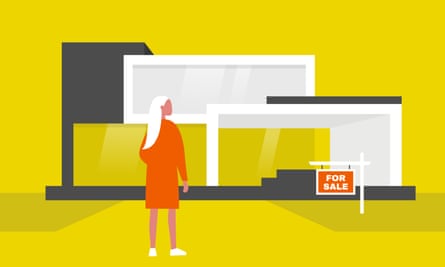If you feel like you’re never going to own a home, you may be right.
A May 2020 report from the Australian Housing and Urban Research Institute forecasts that “almost half” of today’s young people will not own property by age 54. In the year since that report was published, Australian house prices have surged record amounts, making an already tricky property ladder even harder to get a foot on to.
“I really do worry. I think this is something that we’re going to have to face,” says Roslyn Russell, a professor at RMIT’s school of economics.
She co-authored a 2018 report that looked at the determinants of financial wellbeing in older Australians and found that owning property ranks as “the most important indicator” of a secure retirement.
“There are groups of millennials who have been able to buy, thanks to the bank of mum and dad. But there are many young people now whose parents haven’t been able to buy their home or have lost homes,” she says. “They’re not going to have property to leave to their children in the intergenerational wealth transfer we’ve relied upon for so long.
“I do believe it will exacerbate inequality for the Australians who are in their 20s and 30s now.”
It’s not the most comforting crystal ball. So if you’re part of the “almost half” who don’t expect to ever be home-owners, what can you do to try and safeguard your financial future?
While there’s no one-size-fits-all solution, a home isn’t the only thing you can invest in. Here are the pros and cons of your other options:
Investment properties
Common financial wisdom holds that if you can’t afford to buy where you live, you should go for an investment property somewhere cheaper. This approach only makes sense if you’re based in a bigger city – if you already live in regional Australia, there may not be a cheaper location left to invest in.
But if an investment property is a possibility for you, there’s a lot to consider before you go down this route, says Hamish Landreth, a financial consultant at Prosperity Wealth Advisers who works mainly with younger Australians.
“There’s certainly a lot of advantages with an investment property: large investment footprint, good tax deductions you can claim against them, relatively stable asset value, you can borrow against them. They’re all good things.”
But it’s also a single asset in a single location, which is the financial equivalent of putting all your eggs in one basket. Investment properties will tie up a lot of your cash flow, limiting your ability to save or make other investments, and you’ll need to be prepared to foot ongoing bills such as repair costs and council fees.
 View image in fullscreen‘Unfortunately, people buying up property in regional areas does cause an increase in house prices and increase in rents,’ says Dr Braam Lowies of the University of South Australia. Photograph: nadia_bormotova/Getty Images/iStockphoto
View image in fullscreen‘Unfortunately, people buying up property in regional areas does cause an increase in house prices and increase in rents,’ says Dr Braam Lowies of the University of South Australia. Photograph: nadia_bormotova/Getty Images/iStockphoto
Despite what house flipping reality shows suggest, Landreth says investment properties are best treated as a longer-term investment strategy, not a quick stepping stone to your residential home. There are high transaction costs involved with buying property, so any profit you make by selling after a couple of years could quickly be eroded by fees. Instead, “go into it with a five to seven-year time horizon in mind”, he says.
Investment properties also drive up house prices in regional areas, which can lock out prospective local buyers and has a flow-on effect for renters.
“It’s not a friendly market for renters and, unfortunately, people buying up property in regional areas does cause an increase in house prices and increase in rents,” says Dr Braam Lowies, senior lecturer in property at University of South Australia.
“It’s a big issue. In Noosa there’s renters who are being pushed out of the market and forced to live in their vehicles. That’s what’s happening because of this surge of people investing in regional areas.”
Superannuation
The good news is you’re probably already making one of the smartest financial investments. A healthy superannuation balance is important because if you don’t own property at retirement, you’ll need ongoing income to pay your rent.
Russell has found a strong super balance is “the next best option” after owning property for achieving a financially secure retirement, so this is where she suggests “those who aren’t able to get a deposit together” invest.
If you work part or fulltime, your employer will already be paying superannuation on your behalf. But to supercharge your balance, you can salary sacrifice “concessional contributions” on top of your employers payments – up to a combined total of $27,500 per annum. This can also be a smart tax move, because salary sacrificed super contributions are taxed at a lower rate of 15%, and will not be considered part of your taxable income for the year.
 View image in fullscreenYour super fund invests money for you – which helps to grow your balance over time. Photograph: nadia_bormotova/Getty Images/iStockphoto
View image in fullscreenYour super fund invests money for you – which helps to grow your balance over time. Photograph: nadia_bormotova/Getty Images/iStockphoto
The only downside is that your super is (or should be, at least) locked away until retirement – so you won’t be able to access the money you put into it until later in life.
“The biggest disadvantage with superannuation is the preservation,” Landreth says. At the moment, people can retire and access their super at age 60, while those who wish to continue working can access it at 65. “By the time people who are in their 20s or 30s now get through to retirement, it’s very likely that that age will be higher still.”
For casual or self-employed Australians – who do not have superannuation paid for them by employers – it may make more sense to split the money you have to invest between super and other options. That way, you have the option to access that money before retirement age, if needed.
And what about just good old-fashioned savings?
“There’s absolutely a case for it,” Landreth says. The problem is that current low interest rates mean you’re probably not making much return on money in the bank. Canstar’s database on high interest savings accounts shows that even the highest base interest rate of 0.95% is lower than the Consumer Price Index’s current annual inflation rate of 1.1%.
Your super fund, on the other hand, invests money for you – which helps to grow your balance over time.
Shares
No investment option, superannuation and property included, is ever failsafe. But, “if you want to acquire an asset that’s going to go up in value, it generally needs to be a business, property or shares”, says Landreth. “They’re the three main asset classes that will, on average, increase in value over time.”
Landreth says shares don’t have the exact same stability and growth as property, but if you’re looking for a good long-term investment, a diversified shares strategy is a great option. For anyone who isn’t an experienced trader, the best way to get started with this is by going through a stockbroker or financial planner, not hopping on a DIY app and buying crypto or meme stocks.
Investing in shares shouldn’t make you feel like you’re betting it all on red, says Mellisa Ma from Money Girl, a social enterprise that educates women on the basics of financial literacy.
 View image in fullscreen‘The more investments you hold, the less likely you are to have a very poor investment outcome,’ says financial consultant Hamish Landreth. Photograph: nadia_bormotova/Getty Images/iStockphoto
View image in fullscreen‘The more investments you hold, the less likely you are to have a very poor investment outcome,’ says financial consultant Hamish Landreth. Photograph: nadia_bormotova/Getty Images/iStockphoto
“If you look at graphs for the historical return rates for all the asset types for the last 100 years or so in Australia, property and the stock market have basically been head-to-head in terms of returns,” she says.
“I think a lot of people have this misconception that the stock market is a lot more volatile than the property market, but that’s mostly because the performance of the share market is a lot more visible and a lot more widely publicised.”
Landreth agrees, and emphasises the importance of a diversified portfolio. “Don’t put all your investments into one or two stocks. Spread it around. The more investments you hold, the less likely you are to have a very poor investment outcome, because even if one or two go badly the others should hopefully hold them up.”
Just like investment properties, he suggests approaching share trading as a long-term solution. “Shares go up and down all the time, but we also know that they tend to, on average, go up over longer time periods … People lose money when they go into one or two shares for a short period of time, the market drops and then they sell.”
You can even invest in housing via the stock market, through what’s called an unlisted property investment. These typically see a group of investors pool their money on the purchase of a real property you can drive past. After an agreed upon period of time – maybe five, seven or 10 years – that property is sold and investors get their money back, plus whatever value growth the property has seen over that time.
Another advantage of shares is that, unlike a house deposit, they don’t require a huge upfront investment. “Don’t be afraid to start investing small amounts,” Ma advises.
Just do something
If you’re not buying a house, the most important thing is to do “something else” with your money, Landreth says. “Don’t just spend the difference.”
This might not be the same as paying off a mortgage on your own home, but if you’re putting money into other investments bit by bit, “at least you’re still improving your financial position every year.”
“I think the people who get left behind … are the ones who don’t do anything with their money through their 20s and early 30s.”
When it comes to superannuation and savings, compound interest, (where you start earning interest on the interest you’ve already earned) is a key concept to consider.
“It’s really hard to catch up later in life,” Landreth warns. If you don’t start thinking about your finances until your late 30s, “you’ve only really got 15 or 20 years, then, to make money. And it’s hard, it takes a long time. So little amounts is often the secret, I think”.
This article was amended on 12 July 2021 to correct the spelling of Landreth’s name; to clarify that salary-sacrificed super contributions are capped at a combined total of $27,500 in conjunction with employer contributions; and to clarify that the age of preservation for accessing superannuation is 60 for those who have retired, and 65 for those who are still working.



